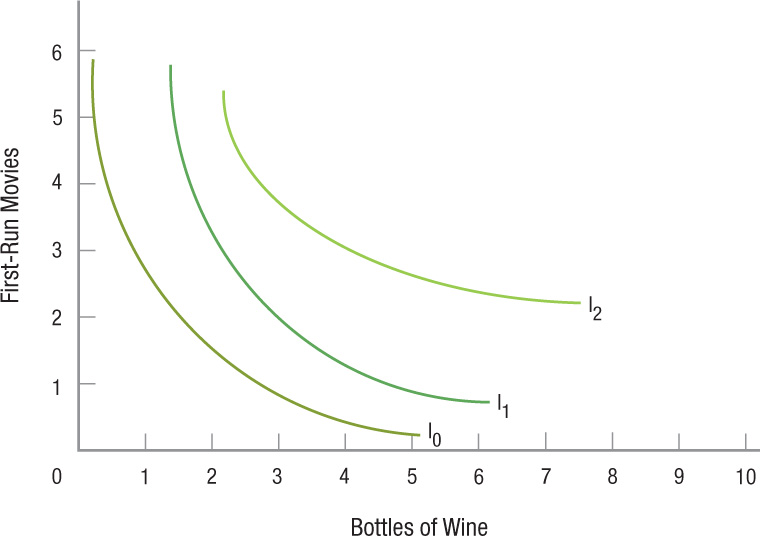Appendix Questions and Problems
Check Your Understanding
Question
gfmhqoy03s4ury1E2rtVEOU0msFyEIcRvfYJux6HqB3Y9+bEkV3fWSVCl8xyfOynL+sKvAb3jJi84U3a8yEk4Q==Prob 6 1. Indifference curves cannot intersect. Why not?Question
A2wjs9AawVGVR+98q4l+S76fc6jKpp9QF3dc5qkHZt9NBs1p/cYLOHzEnK26DkqMTIYf03HUqDfwqKSd0DH+eesti3OzO1cUQ2yMqAGmmjGVcRM1Hry89vqal4tzbVBI2w3OHZ4HfDzTh8onXlfnRnc6lfVfgshtGxzP02upPHGw4L6jxeHf9Q0sBfz+s6IOygWwy6jWreg=Prob 6 2. Explain why the following bundles of apples (A) and bananas (B) cannot be on the same indifference curve: (4A, 2B); (1A, 5B); (4A, 3B).- Answer the following questions using the figure below:

Question
uN8amlrYERFnvXBiLRRoZ28dq0kq9jWs6z4Sldp4nQAIO5w58D0WcdDow4wUz89xnFLq8aNDPvDpUMjP4VD5z2idOsbKqk4wXXqbgPJnat4qtIRJCcvrDF4G5pVdAX+wm/AedBg+a/bzHzUYlYdun9Fg+bUXgwLw7mCqql5XOxlVbFQz7ioHscVAZB/JoODvbIaIxw9jl9XI2g9NTfs8rguScjDn3M58jp8TnppvvG0zRv0wF7Lexrjb8UWUXLY/ZqPE70Nqp+a+C7222sfjr7YJNtSQFsUG5MWQ1qKyF00zr+A8X2rIGMFaIBg6nhfq0bk5B+QEL7hwwk/NJdT5/DRdluWmNl+LIMBqgcLnjoPz3SJG04BtzMTKGp2Mh8qEp40HEdweql4YMiVHcZ0hrw==Prob 6 3a. Assume that you have $50 a month to devote to entertainment (First-Run Movies) and wine with dinner (Bottles of Wine). What will be your equilibrium allocation if the price to see a movie or buy a bottle of wine is $10? Graph the equilibrium on the figure and label it point a.Question
Tf1zctufLt1oHMtgYdxpG0gd39/0tHF2LWcsZ7T7tbHLqakz1lYFpavJfBKSAMCtEfGxTGrOwwRoLw5Ohlw0qiTNzGTAt91SSyHqGP5kmfv/Uq59ySryr2vBfye52oBAQLT/WnKKk/rIQpmbQl0nci58tbAzRXQAXe6dVQgMA2YvFD0oXoQHajU6P+gBqu253Cq7+2rYCtsuYBuY1MJHN3n+EV8vplQ8L59tXEdn+fhFvxbxhFclkQ54pN4jasHB72arrXu+kuaZo2YQMA+rDjUgkfgIRjGw+B2uZ35NJKb8yznPcfzswNboNCh1FMnHAnkf6XyoSdXnmKczZQ0t7sqYTLDnruWYy77Oo9ZLm08oFZ3+xWzN+t4DFH8QQDQTSy2dRdvEh8WumwULWGp6rYXocaezqD0sv7mUAeMtt98v3uI9UpLqlw==Prob 6 3b. A grape glut in California results in Napa Valley wine dropping in price to $5 a bottle, and you view this wine as a perfect substitute for what you were drinking. Now what will be your equilibrium allocation between movies and wine? Graph that on the figure and label the new equilibrium as point b.
Question
x77fYMmignFnuZqGJoHmXRTmwYC+VYjyyyGxYhcU3B3A7s1mVvn7I87nLJJz12zBfi8s963ltMdT24GjocsokOl7EtErOpYH3itn6vrmtl8V+3p2NfVo2Y8GVR8lpeqK2MMyTt8hBtMPZnRJ9tOrvdkYo7gU/YMzC86dlazO0gvAB0mN26kPnExRN/6aAm4Vbm25gKCp5N7fXqG4Igoqb4+dZL84ILb0zngDjZEZOjQxidmyTnTt0/luIGBxZJhq5L/2ALe2hFCBIhbcZuEOR4ohNjdz/TK6iZGsZITbMHa+oYUnyhDPDnW3pNWN4/JVzrna017ZARpUyixo4uqC7IfQ2f1r4SkbGsbI2mvicq0o9DKGMtzGNItJSMvEzpgz3ZhJnZisGUfEV1wP7oiq3/MItUjuOLEHqkvrR3z1BrI6XZZ6OCGAKEEH7HJDPlte/2BvOgWULoHGv+Mn2H7hhlV7EgKpa1GZASpeJTht5sIlwFhmuDnpBt4pkNTCiW5/PwW1j5RWaCv0fkwQf4r18lMzhQIDK91tLToMtO+A15LzK7nkVX9B0UZW8hzppi8AYSAzCFChfZ35PJIQT3qPVOJb7vP5uocS3Am0QRxRB+LttqI2FXLtK09yd6FqXNtg1E3tfFo8CKN9yc02cqJp/+kEX5Cnv+9TZ3xQZXb/NvOqdhRXKc4Rwott4fx52Pf9/jXwU7MJx9AMcbHycykRP92G2wgshwTapICDK0w4CViBOjdqYjKPdidFPxSE7LPZtLjleQXXUAji4Xs4akn9bctDDnNdquWSnhpcla0H609chandOj27kgFQaNpvjRkNAGPkpafOrDCUZ4KMrc70k24u7skxf3VyNAN5sW1XKKtStN2CnHCTdGLa5nDoVHkiKd9zaj5bTzX1lJj5LSGMkQr94sAg3KxUhIZKUMuB8TXItdwYQ/tYUI/fgHYq14mjnCb4EHCXyr2HZWaNX+B+rL8h4zlaAV5FoWOgy9t5EMtq+AcLNJ1BpSFRMAjA28ZOBVIDYjTbdwJ0FL15N+A3DWQvY0zKh8QWuSYUqza8kpCuJucngeoXqe+VWe4unRO6Ln/pCOxwmhbOZD8UoHkSrfJIqH+HeRzRynRWPTVwbBiN9wDG7udBQxDFy6+57vosYZm3UN3zXQu3a9nXA0TDgt7wOC43xCVMzo9I+P8YgXHE2qaF8qatV4K9AcdY1U3tQMMlB2zyg//rL5GdcH3YUU8MunrhoNLM6OJ5xqmL4qwHqZ7ubUJo/mPgOHnH1ZJC3x+bR7rz9iijjMzpemLPOYnR+F4Eq2dJg+ZEGa+82MS4eZmBhtrWnsmEtEq8Z6tt3GAggnZlE1RSIHQ9LGdtEAGy+rmFTQKe+CnFzFWtQCetx9Q6riyu/Ew3K0wegBztuT5JIZH/th6HpaXA1ws2t21rNNQ83tqYzUzjEFdvJ3BAkaYF5csaqS3TDSrkNLb1EFvvZxDkmMLwExQ48rG3N04GSs2lID4jSxvIPoUQFHImyFk7DO12eCqErKZEJxOs0zjcg4OQwG9f2vm1Y3IP94KlvpPiMYNbYkAQfBgpv2oMWNy0yv9ZdFki4qs=Prob 6 4. Research by Walter Enders and Todd Sandler, The Political Economy of Terrorism (New York: Cambridge University Press), 2006, and David Wessel, “Princeton Economist Says Lack of Civil Liberties, Not Poverty, Breeds Terrorism,” Wall Street Journal, July 5, 2007, p. A2, suggests that terrorists are not spurred by poverty, but rather often are educated individuals who live in countries with a lack of civil liberties. These researchers treat terrorists as rational actors who maximize a set of goals subject to constrained resources.
Assume that terrorists can choose between nonviolent acts and violent acts. Draw a budget line and indifference curves that show where a utility maximizing combination of these activities would occur. Now suppose that the U.S. government can choose between two types of antiterrorism policies: (1) a defensive approach such as increased airport screenings, and (2) a proactive approach, which includes activities such as infiltrating terrorist cells and freezing bank assets. Analyze how these policies affect the budget line of terrorists and how it affects the utility-maximizing combination of terrorist activities.
162